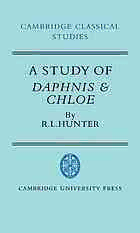
A study of Daphnis & Chloe PDF
Preview A study of Daphnis & Chloe
CAMBRIDGE CLASSICAL STUDIES General Editors J. A. CROOK, E. J. KENNEY, A. M. SNODGRASS A STUDY OF DAPHNIS & CHLOE A STUDY OF DAPHNIS & CHLOE R. L. HUNTER Fellow of Pembroke College, Cambridge CAMBRIDGE UNIVERSITY PRESS CAMBRIDGE LONDON NEW YORK NEW ROCHELLE MELBOURNE SYDNEY CAMBRIDGE UNIVERSITY PRESS Cambridge, New York, Melbourne, Madrid, Cape Town, Singapore, Sao Paulo Cambridge University Press The Edinburgh Building, Cambridge CB2 8RU, UK Published in the United States of America by Cambridge University Press, New York www.cambridge.org Information on this title: www.cambridge.org/9780521254526 © Faculty of Classics, University of Cambridge 1983 This publication is in copyright. Subject to statutory exception and to the provisions of relevant collective licensing agreements, no reproduction of any part may take place without the written permission of Cambridge University Press. First published 1983 This digitally printed version 2007 A catalogue record for this publication is available from the British Library Library of Congress Catalogue Card Number: 83-3928 ISBN 978-0-521-25452-6 hardback ISBN 978-0-521-04137-9 paperback CONTENTS Preface Vii References and abbreviations iX 1 Title, author, date 1 2 The constituent elements 16 (i) Daphnis and Chloe 16 (ii) The legend of Daphnis 22 (iii) The gods in Daphnis & Chloe 31 (iv) The prologue 38 (v) The included narratives 52 (vi) Conclusion 57 3 The literary texture 59 Appendix A: Longus and Sappho 73 Appendix B: Longus and Philitas 76 4 Language and style 84 Notes 101 Bibliography 130 Index of passages discussed 132 Index of subjects 135 v PREFACE The prose fiction of antiquity has been the subject of increas ing scholarly attention in the last twenty-five years, and Daphnis & Chloe has benefited from this general revival of interest. Nevertheless, critical progress has been hindered by the lack of a basic guide to the literary and rhetorical back ground against which this work was written. The present essay is an attempt to fill that gap. I have tried to combine information of a kind which is usually found in a continuous commentary with an outline of the various interpretative directions in which that information points. About the 'origins of the Greek Novel', the problem which has domi nated scholarship in this field ever since the publication of Erwin Rohde's magnificent study Der griechische Roman und seine Vorlaufer, I have said very little, although Longus' exploitation of the traditions of historiography and comedy serves as a reminder of two major influences on the fiction of later antiquity. My silence on this subject will, I hope, suggest that it is unhelpful to view Daphnis & Chloe as 'the standard ancient novel' relocated in a pastoral setting and that a solution to the problem of the origins of the genre as a whole is unlikely also to supply the key to an appreciation of a particular example of the genre. The Greek novels which survive in a manuscript tradition differ from each other so widely in terms of wit, rhetorical skill and narrative coherence that, even after the standard division into pre-sophistic (Xenophon of Ephesus, Chariton) and sophistic (Achilles Tatius, Longus, Heliodorus), it makes very little sense to treat them as though they were almost identical specimens off a production-line. I am rather less happy that I have had little to say about the relationship between the world presented in Daphnis & Chloe and rural life on the Aegean islands in the second and VII PREFACE third centuries A.D. Even if, however, I were fully competent to discuss the social and economic history of the Roman Empire, it may be doubted whether prolonged consideration of this topic would prove very fruitful. Longus presents us with a stylised picture of rural life on an island famous for poetry and wine, and this picture is consistent and, in its own literary and rhetorical context, plausible. Analysis of Daphnis & Chloe can, of course, tell us something about attitudes towards the countryside in the period in which it was written, although it is in other respects so individual a work that we should be cautious about using it as a repre sentative expression of the views of a whole social class. In preparing this study I have incurred a number of debts which I here gratefully acknowledge. Michael Reeve kindly sent me a copy of his text of Longus before its publication, and Ewen Bowie's comments on the penultimate version of this essay identified many obscurities and saved me from several errors. Susan Moore guided the book through the final stages of preparation with her habitual care and acumen. I wish to thank the General Editors of Cambridge Classical Studies and the Faculty Board of Classics for undertaking the publication of this work and, in particular, Professor E. J. Kenney for his assistance and encouragement. Four institutions have put me deeply in their debt: the British Academy, which provided financial assistance towards a period of research abroad; the Fondation Hardt in Geneva, where that research was conducted in ideal surroundings; the Cambridge Univ.ersity Press, which has handled this book and its author with enviable skill; and Pembroke College, for whose continued kindnesses this slim volume is scant reward. If she had allowed it, my largest debt of all would have been acknowledged in the dedication of this book to my wife. Cambridge R.L.H. April, 1983 Vlll
